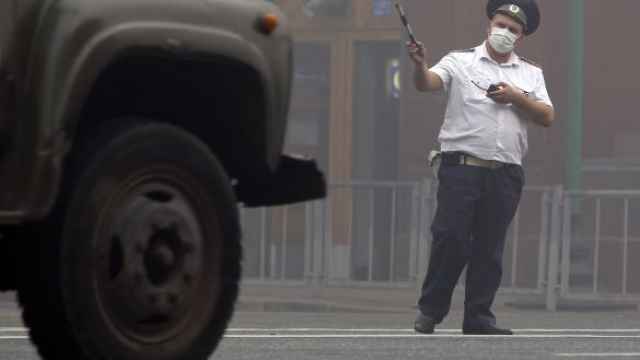Полиция: police
It’s now Week 6 of — yeah, I’m bored with being hot and miserable, reading about being hot and miserable and writing about being hot and miserable. So I spent several hours in my gas mask, scanning the news for something other than heat, fires, smog and death. I wanted something entertaining.
I immediately noticed reports about the Russian cops’ name change. Now that’s good for a laugh. Come on, guys! Don’t you have something better to do right now? Like buying some fans for those aid centers you opened in Moscow?
But after some poking around, I discovered that names for law enforcement in Russian are quite interesting. And I found an ancient linguistic connection between fires and cops, which makes the current reform effort very timely.
Right now, the law enforcement folks are called милиция (literally, “militia”). In Russian, like in English, the main meaning of the word is a voluntary group of untrained citizens mustered in times of emergency. But in 1917, the Provisional Government liquidated the tsarist полиция (police), and to show that they were on the side of the people, they instituted народная милиция (the people’s militia) in its place. In 1919, Lenin signed a decree “О советской рабоче-крестьянской милиции” (on the Soviet workers’ and peasants’ militia). Although “Soviet,” “workers” and “peasants” have disappeared from the name, милиция stuck.
It’s the notion of “voluntary, untrained and unprofessional” in the word милиция that President Dmitry Medvedev and Interior Minister Rashid Nurgaliyev are referring to in their comments on the name change. For example, Nurgaliyev said: “Что такое полиция? Это профессиональное сообщество профессионалов.” (What’s the police? It’s a professional community of professionals.) And Medvedev said, in part, that the милиция was: “ … по сути, дружинники в погонах. Но нам нужны профессиональные люди.” (… in essence, volunteer citizen patrols in epaulets. But we need professionals.) OK, we got it. Key word: профессионализм (professionalism).
Полиция appeared in Russia thanks to Peter the Great, who brought back the word and concept in his suitcase of Western reform. For a couple of centuries, there was a mix of native Russian and foreign words to describe the force. For example, the head of a city police department was полицмейстер (police chief), but precinct heads were надзиратели (inspectors), and the beat cops were called городовые in the city and стражники (warders) in towns. For full foreign flavor, there was also жандармерия (gendarmerie), which apparently handled political crime — perhaps in French for that continental touch.
In pre-Petrine Russia, police had colorful names and, in some cases, wore colorful clothing. For example, Tsar Alexei Mikhailovich introduced земские ярыжки (something like country warders), who policed large cities wearing the letters “З” and “Я” on their clothing. In Moscow, they wore red and green.
For a while, police chiefs were called городничие, and before that — огнищане. This word sent me on an interesting search. It originally meant “хозяин подсеки” (also called огнища) in Novgorod. The owner of what? More searching revealed that подсека and огнища meant land that had been cleared through slashing and burning, and огнищане were originally land- and house-holders who supported the local prince. So the process went like this: Slash, burn, own land, grow rich, work for the leaders policing the streets.
Today, as the militia rises out of the ashes like a phoenix, let’s rename them огнищане. And dress them in red and green.
A Message from The Moscow Times:
Dear readers,
We are facing unprecedented challenges. Russia's Prosecutor General's Office has designated The Moscow Times as an "undesirable" organization, criminalizing our work and putting our staff at risk of prosecution. This follows our earlier unjust labeling as a "foreign agent."
These actions are direct attempts to silence independent journalism in Russia. The authorities claim our work "discredits the decisions of the Russian leadership." We see things differently: we strive to provide accurate, unbiased reporting on Russia.
We, the journalists of The Moscow Times, refuse to be silenced. But to continue our work, we need your help.
Your support, no matter how small, makes a world of difference. If you can, please support us monthly starting from just $2. It's quick to set up, and every contribution makes a significant impact.
By supporting The Moscow Times, you're defending open, independent journalism in the face of repression. Thank you for standing with us.
Remind me later.







